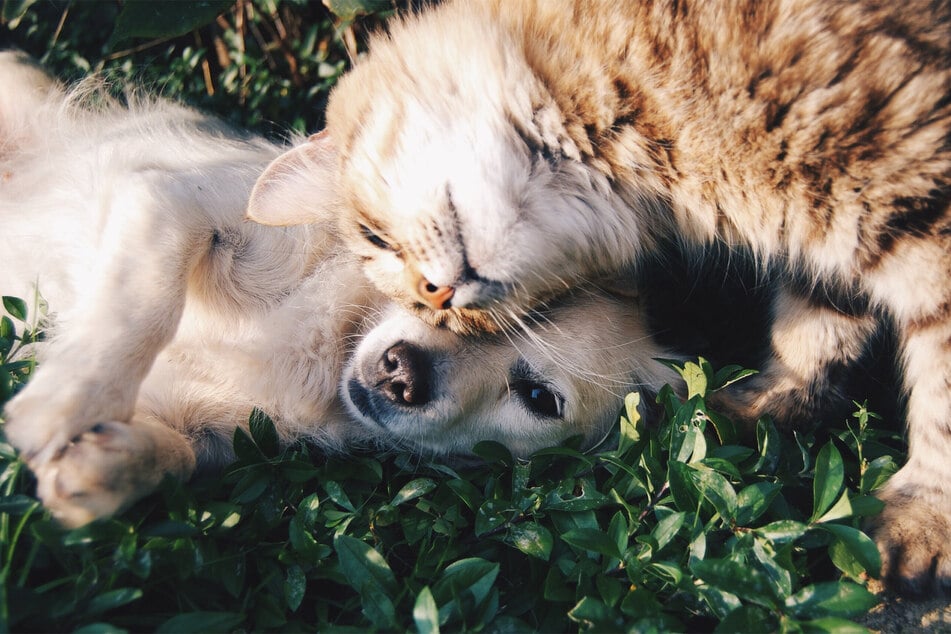Cat allergy symptoms, treatments, and causes
Cat allergies are a silent enemy that stops many animal lovers from adopting a feline friend. But what causes cat allergies, what are the symptoms, and – most importantly – are there any treatments available?

Sneezing, snuffling, and coughing – cat allergies can be a really debilitating thing for certain people, creating constant and chronic health issues that make life truly unpleasant.
It's understandable that even those who normally love cats end up avoiding them entirely if these suffer from this ailment – but do they really have to?
In this cat guide, TAG24 takes a look at the causes and symptoms of cat allergies, while trying to figure out if there's a way to help make space in your life for a fluffy feline friend!
Why am I allergic to cats?
People who have cat allergies generally have overly sensitive immune systems when confronted with the small particles that cat fur spreads through the air. Indeed, it is not usually the hair itself that people are allergic to, but the saliva, the urine, or the dried flakes of skin that often comes along with that fur.
What happens is that the small proteins within these things get mistaken by our bodies as dangerous, triggering an immune response. Seeing as this is the case, even non-shed cats will still cause people's allergies to flare up. The difference, though, is that since these particles are generally spread through the fur, a cat with less fur will have a more difficult time triggering allergies.
Cat allergy symptoms
We've all seen that relative whose nose starts dripping and whose eyes go bright red as soon as your cat walks in the door. Some people have it far worse, though, so it's good to spread some awareness about just how bad these allergies can get.
Here are the most common symptoms of a cat allergy:
- Severe cold and flu symptoms such as sneezing, and a running nose
- Coughing, often combined with shortness of breath
- Extreme red and itchy eyes, similar to in a person with hay fever
- Serious skin rashes and hives
- Tightness in the chest
- Nasal congestion
Don't underestimate the symptoms: While many of these symptoms may seem pretty mild, and similar to those experienced by someone infected with the common cold, in some people these issues become extreme. In some people, the cat fur can actually cause things like asthma attacks and other breathing issues.
How do I know if I'm allergic to cats?
Many people think that they are simply allergic to dust, or perhaps someone's perfume, when it has actually got something to do with their beloved kitty. The real question, though, is whether they are simply in denial, or whether they truly don't know.
You will know that you have a cat allergy if you experience the symptoms when around cats. Alternatively, if you have milder symptoms that could be caused by something else, an allergist will be able to help you out.
How long do cat allergy symptoms last after exposure?
For most people, symptoms will settle down within a couple of hours of leaving the cat-infested room. Others with more serious bouts of cat allergies have been known to sustain symptoms for more than half a week.
In general, longer-term symptoms take the form of swollen eyes, general itchiness, and the feeling of having a cold. It is very common for people to mistake these symptoms with those of hay fever, as the latter affliction is extremely similar.

Cat allergy treatment
If you have severe cat allergies, then you need to go to the vet and have it checked out professionally. We're not doctors, so you won't get any medical advice here. However, for reference, here's list a few of the most common treatments there are for cat allergies.
Some of the most common cat allergy treatments include:
- Nasal steroid sprays: These are commonly used to treat asthma as well, and are usually available over the counter.
- Antihistamines: Commonly used to treat hay fever, antihistamines will provide a good deal of relief for cat and pet allergies as well.
- Allergy shots: While not always effective, those who have access can take a multiple year treatment course. It's important to note that these shots are not vaccines. They provide relief and greatly improve on your symptoms, but won't cure you of your allergies.
- Exposure from a young age: It is widely acknowledged that children who are exposed to cats and other pets are less likely to become allergic when they get older.
Ultimately, the best way to solve the problem of cat allergies is to simply reduce your exposure. This, of course, is not a particularly useful piece of advice as it can be hard to do so sometimes, and many people love cats despite their allergies.
If you've got cat allergies but still want a feline friend: Some people are cat lovers despite their anatomical aversions. These people can mitigate their symptoms by trying to keep their distance when possibly (so no sleeping in the same room), restricting their cat to certain areas, keeping it outdoors a lot of the time, and keeping everything very clean all the time.
Treat mild cat allergy rashes
Immunotherapy and other medical treatments are used to treat cat allergy rashes, but it is really up to your doctor. We would recommend speaking directly with a medical professional. They are likely to prescribe you particular creams and ointments to treat the rash, but they may suggest something else.
How to get rid of cat allergies naturally with home remedies

If you have light cat allergies and want to reduce your symptoms naturally over time, there are a number of things that you can do. While it is impossible to get rid of them completely, by reducing your exposure to the allergens themselves, you may be able to provide enough relief to make cat ownership possible.
Here's how to get rid of cat allergies naturally:
Don't sleep near your cat: Make sure that your cat doesn't enter your bedroom, so that you have fur-free air when you are sleeping. Certainly don't allow your cat on the bed, as this will directly deposit the particles upon your sheets and pillows.
Don't hug or kiss your cat: While it's not really possible to avoid petting your cat, you can avoid things which will deposit fur on your clothes. As such, don't hug your cat and certainly don't put your face super close to it. It won't appreciate that big juicy snog anyway, so there's no need to indulge yourself.
Wash after petting your cat: When you do pet your feline friend, make sure to wash your hands thoroughly afterward and give yourself a decent brush down. You don't want to carry the fur around with you, constantly triggering your allergies.
Use air filtering devices and keep windows open: There are a variety of different air filter options available just from retail stores alone. They remove particles from the air that may cause allergies and filter out air pollution. Basically, you want to remove the particles, so keeping the room well ventilated is also crucial.
Keep your cat brushed and clean: Get your partner or friend to regularly groom and brush your cat (when you are not around) and make sure that it is cleaned, so that there is less of a need for it to lick its fur.
Don't hold your breath, though, as there is no way to entirely remove the offending particles from air in which a cat resides. We understand the love, but make sure to check with your doctor before adopting a cat if you have an allergy.
How to stop being allergic to cats
There is absolutely no way to completely stop being allergic to cats. Sadly, if you develop a cat allergy, you will likely have it for the rest of your life. There are ways to reduce your symptoms and get you to a perfectly functional level (as described above), but not eliminate the problem entirely.
If your cat allergies are seriously bad, then sadly there is nothing that you can really do except avoid owning or being around cats. Check with an allergist to see if you are allergic to dogs – maybe they could be a nice alternative?
Cat allergies are unpleasant, but they don't have to stop adoption
With good treatment, the right cat breed, and regular grooming, it is possible to own a cat even if you have mild cat allergies. Those with more intense and severe allergies, however, should not own a cat and should try their best to avoid them as much as possible. After all, long-term exposure to allergens can cause more serious health issues down the line.
If you're not really sure whether cat allergies will cause more serious long-term health consequences, you need to talk to your doctor. They will be able to test for such things, and provide you with more certainty.
Cover photo: IMAGO / Image Source & IMAGO / SNA (TAG24 Edit)




